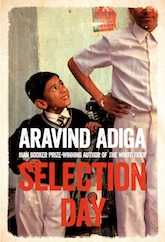Selection Day
Aravind Adiga
|
|
This novel about two young boys from Mumbai whose father raises them to be “the number one and number two batsmen in the world” seems to signal early on what kind of story it will be. While ignoring all the brothers who have played cricket for their national sides with great individual and sometimes shared success – the Waughs and Crowes and Mohammads – Adiga writes, repeatedly, of the one-time princes of Mumbai school cricket, Sachin Tendulkar and Vinod Kambli.
They were not brothers, but childhood friends and teammates whose stars seemed destined to rise together when, aged 16 and 17, they had a record-breaking 664-run partnership in school cricket, which had widespread news coverage at the time. But while Tendulkar went on to be the world’s most lionised batsman, Kambli’s test career was over by the time he was 24. It seems clear that Adiga is setting us up for a story in which one brother will rise and one will fall – but knowing this does nothing to detract from the enjoyment of the story. His two brothers are Radha, the elder, and Manju, the younger; their father has decided the elder will be the greater of the two, and for a while the boys go along with this idea, any sporting rivalry between them a minor matter compared with their shared terror of their tyrannical father. But the contemporary world of Indian cricket in which the boys are growing up is a very different one from that in which Tendulkar and Kambli grew up at the end of the last millennium. Cricket is money in India, to a degree unimagined 20 years ago. The shortened Twenty20 format has brought in new audiences and given rise to the Indian Premier League, beloved of sponsors and bookies and tainted with betting scandals. While some complain that the IPL is ruining the sport, others point out that it creates possibilities for cricketers of talent and nerve to rise from obscurity, and even poverty, to prosperity and fame. This, it turns out as the novel progresses, is the story Adiga wants to interrogate via his two cricketing brothers. The tale of two boys who will divide success and failure evenly between them is far too simplistic for a novelist of his calibre – and anyway, success in sport can be the most temporary state, and is never without a personal cost. Cricket is, of course, a wonderful way of writing about shattered dreams – both personal and national. As such, it isn’t necessary to know the game to appreciate this finely told, often moving and intelligent novel. Cricket here represents what is loved in India, and yet is being corrupted by the changes within the nation. As Tommy Sir, the cricket coach who yearns to discover the next Bradman or Sobers, remarks: “How did this thing, our shield and chivalry, our Roncesvalles and Excalibur, go over to the other side, and become part of the great nastiness?” That Tommy Sir himself is part of the great nastiness, introducing the teenage brothers and their father to a man who bankrolls them during their adolescence in return for a cut of all future sponsorship deals, only makes the question more poignant. But the great nastiness of cricket isn’t only to do with money and corruption. Adiga’s novel takes in class, religion and sexuality – all issues that disrupt the dream of a sport that cares for nothing but talent and temperament. Because Adiga is a novelist, and one who has grown in his art since his Booker prizewinning debut, The White Tiger, he knows how to talk about all these matters through his characters and their compelling stories. The relationship of the two brothers is significant but eventually becomes secondary to the one between the younger boy, Manju, and Javed, a good-looking Muslim from an affluent family who chooses to walk away from cricket and wants Manju to follow him. Manju’s attraction to Javed, and his awareness of the barriers between them, is subtly and often surprisingly explored. At the end, there was only one question I wanted answered: does Manju love cricket? We are told that he does, but his thoughts about the game are almost always about success or failure – or about his father, brother or Javed – rather than the sweetness of the perfectly timed cover drive or the moment when the noise of the world falls away and all that remains is the contest, mental and physical, of bat versus ball. But perhaps that’s the point: for Manju, the noise of the world doesn’t fall away. It is always there, drowning out everything, even love. Kamila Shamsie | 10 Sept 2016 | The Guardian
|


 Aravind Adiga
Aravind Adiga